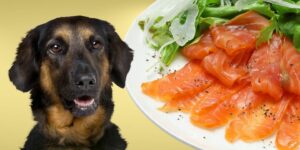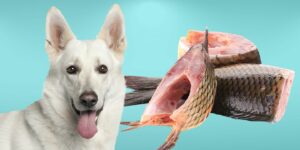Can dogs eat raw salmon? The short answer is no, dogs should not eat raw salmon due to the potential risks associated with parasites and bacterial contamination. While some may argue that raw salmon offers health benefits such as essential fatty acids and protein for dogs, these benefits do not outweigh the potential dangers. Instead, dog owners should seek safer alternatives to provide their dogs with the nutritional benefits of salmon.
The Debate on Raw Diets for Dogs
The ongoing debate about raw diets for dogs centers around potential benefits such as improved coat quality, increased energy levels, and better overall health. However, the controversies surrounding these diets often involve the risks of bacterial contamination, parasites, and an unbalanced diet.
Understanding Salmon Poisoning Disease (SPD)
Salmon Poisoning Disease (SPD) is a potentially fatal condition caused by the parasite Neorickettsia helminthoeca, which is found in raw salmon. Symptoms of SPD include vomiting, diarrhea, fever, and lethargy. If left untreated, SPD can lead to the death of the infected dog.
The Lifecycle of Neorickettsia helminthoeca
The Neorickettsia helminthoeca parasite has a complex lifecycle involving multiple hosts, including salmon and snails. Dogs can become infected with the parasite when they consume raw salmon that has been infected with the encysted larvae.
Prevention and Treatment of SPD
The best way to prevent SPD in dogs is to avoid feeding them raw salmon. If a dog is infected, SPD can be treated with antibiotics and supportive care provided by a veterinarian. Early detection and treatment are crucial for a positive outcome.
Bacterial Contamination in Raw Salmon
Raw salmon can harbor bacteria such as Salmonella, which can cause serious illness in dogs. Symptoms of Salmonella infection include diarrhea, vomiting, fever, and dehydration.
Preventing Bacterial Contamination
To minimize the risk of bacterial contamination in raw salmon and other meats, ensure proper handling and storage, and avoid feeding raw meats to your dog. Cooking the meat thoroughly can kill bacteria and make it safe for consumption.
Safe Alternatives to Raw Salmon for Dogs
There are safer options available for offering the nutritional benefits of salmon to your dog without the risks associated with raw salmon.
Cooked Salmon for Dogs
Properly cooked and deboned salmon can be a safe and healthy addition to your dog's diet. Be sure to remove all bones and cook the salmon thoroughly to minimize the risk of contamination and choking hazards.
Salmon-Based Dog Foods
High-quality, salmon-based commercial dog foods offer a safe and balanced alternative to raw salmon. These dog foods provide essential nutrients without the risk of raw fish consumption.
Supplements for Omega-3 Fatty Acids and Protein
Omega-3 fatty acid and protein supplements can provide the essential nutrients found in salmon without the risks associated with raw fish consumption. Consult your veterinarian for recommendations on suitable supplements for your dog.
Additional Precautions When Feeding Salmon to Dogs
Proper storage, handling, and preparation are essential when feeding salmon to your dog. Always monitor your dog's health and consult your veterinarian if any symptoms of illness arise after consuming salmon.
Monitoring Your Dog's Health
Keep a close eye on your dog's health, especially if you have recently introduced salmon into their diet. If you notice any signs of illness, seek veterinary attention immediately.
Final Thoughts
Prioritizing your dog's safety and health is crucial when considering their diet. While raw salmon may offer some nutritional benefits, the potential dangers far outweigh the advantages. Explore alternative options, such as cooked salmon or salmon-based dog foods, to provide your dog with the benefits of salmon without the risks.











